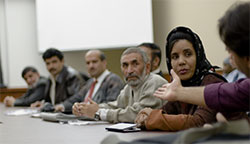A Long Way To Go For a Math Clinic
Six Afghan educators visited Teachers College for three weeks in November to learn new ways of teaching mathematics back home. They came away prepared to write new math textbooks and train their colleagues. Along the way, they also visited Ellis Island, Ground Zero, Jazz at Lincoln Center, Philadelphia's Independence Hall, and the United Nations, where they met with Ravan Farhadi, Afghanistan's ambassador to the U.N.
With Afghanistan still recovering from decades of war, "pedagogy there has really fallen apart under tremendous strain," says Barry Rosen, Director of the TC Afghan Education Project, which sponsored the visit. "So we decided, let's work with math -- it's the least controversial subject and one that we can get a handle on."
Current Afghan teaching methods follow an old-fashioned, teacher-centered model that requires rote memorization and unquestioning response from students. Rosen and the Afghan Education Project have focused on critical thinking, creativity and a deeper understanding of lessons.
The six Afghans at Teachers College -- three math teachers, two textbook writers and one teacher educator -- spent most mornings in a seminar led by Teachers College instructors, with topics ranging from goals of math instruction and inquiry in the classroom to multiplication and division strategies to writing problem-solving lessons. On other mornings they observed math instruction at area schools, both public and private.
Afternoons were spent touring the area or meeting with members of the local Afghan community. The delegation also attended a performance of "Beyond the Mirror," an off-Broadway play about Afghanistan that is being jointly produced by theater companies from the U.S. and Afghanistan.
Teachers College began training Afghan teachers in 1954 and continued until the Soviet invasion in 1979. After the fall of the Taliban, Rosen (a former head of external affairs for TC who was held hostage in Iran during the late 1970s) led a new team of educators to Kabul in July 2003. He continues to lead the current group, along with retired TC Professor Margaret Jo Shepherd. The project's past funding for commissioning Afghan textbooks and training teachers has come from UNICEF, the Christian A. Johnson Foundation and Patricia M. Cloherty, a member of the President's Advisory Board at TC. Now, Rosen (who is fluent in Dari, one of the country's two dominant languages) and Shepherd are seeking new funding to return to Afghanistan this winter.
Published Wednesday, Dec. 21, 2005
